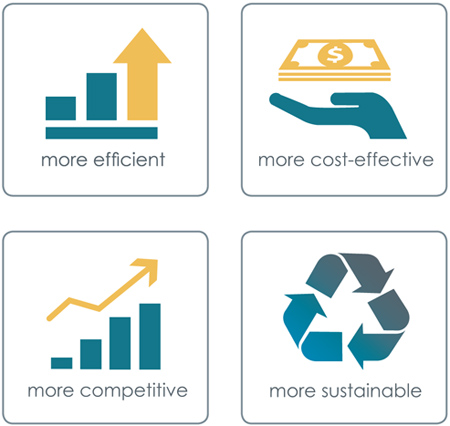The EPOS project develops a simple and single management tool for exploring
industrial symbiosis (IS) across process sectors. A wide range of technology
and management solutions is proposed for supporting collaboration between
sectors, by making industrial sites more efficient, cost-effective, competitive
and sustainable.
From the start of the project, the consortium has
challenged its process industry sites to get to know
nearby companies from other sectors and understand
their plants, operations, site streams and management.
Meanwhile, new ways of doing cross-sectorial business
are introduced and tested, always starting from a sound
industrial pragmatism.
The UGent cluster management surveys map current and
potential cross-sectorial IS cases. The prioritisation of IS
opportunities from the longlist has initiated early IS deals
within the EPOS clusters, inspiring generic business cases
with IS potential for process industry clusters across
Europe.

In parallel, after completing detailed energy studies
on the EPOS sites using the EPFL energy optimisation
platform Osmose and merging with the survey findings,
the shareable streams are mapped, and virtual sector
profiles built. These profiles are an open-innovative way to
share industrial information from industries by simulating
typical operating modes of a given industry sector. They
enable a systems approach and are an essential part of
the toolbox.
The case of heat recovery from an EPOS steel site feeding
the Dunkirk district heating network (FR) serves as a
textbook example of symbiosis. It points to the success
factors driving over 30 years of operation on which the
database of technical and non-technical indicators for the
EPOS toolbox is built.
The new cross-sector IS cases at the Hull (UK) and Lavera
(FR) industrial clusters have supported the EPOS toolbox
development. The findings were used to challenge the
metrics, system settings, functionalities and operating
modes of the EPOS platform. Modelled and integrated
into the toolbox is also a selection of more than 25
IS-supporting technologies. And not at least, the multiobjective
optimisation function of the EPOS toolbox
embeds sustainability and economic parameters that
allow for the calculation of triple bottom line gains for a
given set of IS solutions.
The EPOS User Club grants access to the EPOS toolbox
and shares all guidance material on using the toolbox and
investing in IS (manuals, background information, generic
cases, etc.).
 Contact information:
Contact information:
Coordinator: Greet Van Eetvelde
Email: info@project-epos.eu
Web: www.spire2030.eu/epos
This project has received funding from the European Union's Horizon 2020 research and innovation programme under grant agreement No 679386. This work was supported by the Swiss State Secretariat for Education, Research and Innovation (SERI) under contract number 15.0217